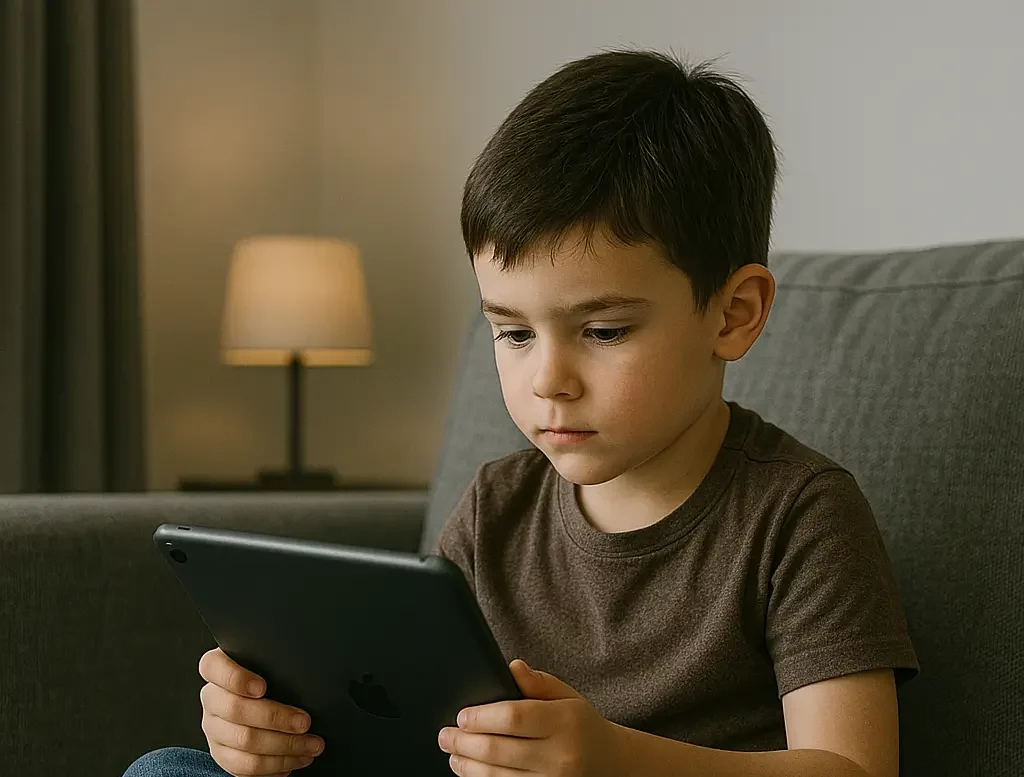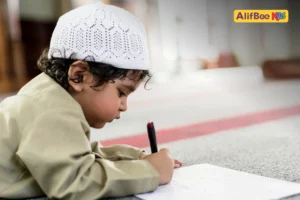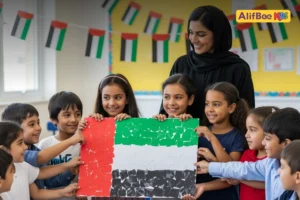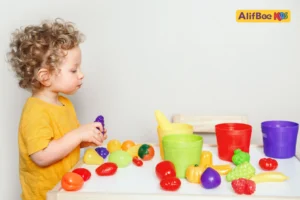Turn Screen Time into Learning Time
Parents often face a tug-of-war when it comes to screen time. On one hand, we want to limit excessive device use, but on the other hand, screens can be powerful learning tools. The question is: How do we ensure screen time for kids is beneficial rather than harmful?
The answer lies in the difference between passive vs. active screen time—and more importantly, choosing the right apps that engage children in meaningful learning. If you’re a parent looking to teach your child Arabic while making the most of their screen time, you’re in the right place!
We will start by looking at the difference between active and passive screen time. Then, we will explore how AlifBee Kids turns screen time into an educational and enjoyable experience.
We will also offer you valuable tips to help your kids use screen time effectively to learn Arabic Language using the AlifBee Kids app.
Passive vs. Active Screen Time
First of all, parents should know that not all screen time is bad. There’s a big difference between a child mindlessly watching cartoons or aimlessly playing an addictive video game and one actively engaging with an interactive learning app.
From the limited time parents are advised to let their kids spend using screens, parents’ choice of what their kids are watching is key. You can help your child turn screen time from a passive experience where they are exposed to harmful content or one that offers no value, in the best case scenario, to screen time that is beneficial.
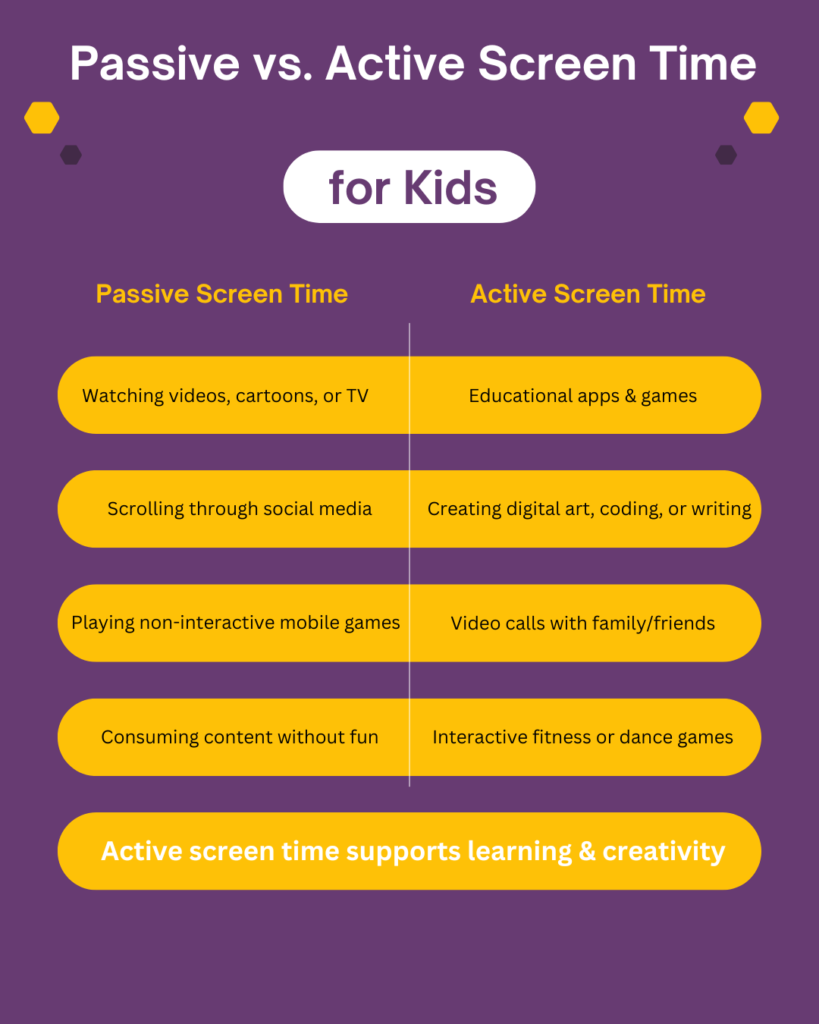
Passive Screen Time for Kids
In passive screen time, children get no benefit since they are:
- Watching endless videos without engagement.
- Playing games that offer no educational value.
- Not involved in interactive activities, problem-solving, or creativi.
According to the American Academy of Pediatrics, too much passive screen time can lead to countless health and cognitive problems. Children who spend long hours passively watching videos or playing games could suffer from shorter attention spans, lower cognitive development, and sleep disturbances.
Active Screen Time for Kids
On the other hand, screen time, which involves the child’s involvement and interaction, is considered beneficial, or active. Kids are actively involved in learning and developing key cognitive and linguistic skills when they are:
- Engaging with educational apps that involve interaction.
- Solving puzzles, learning new words, or following interactive stories.
- Using adaptive learning tools that adjust to a child’s progress.
Experts say that interactive screen time improves cognitive skills, language development, and memory retention.
If used wisely, screen time can be a powerful tool for learning—especially when it comes to acquiring new languages like Arabic!
How AlifBee Kids Blends Play with Learning
Choosing apps that combine education with entertainment is key to making screen time productive. That’s exactly what AlifBee Kids does!
AlifBee Kids games and activities are designed to be interactive and to teach kids through play. Instead of passively watching an Arabic lesson, a child using AlifBee Kids will be active in the learning process. He will tap, match, and interact with Arabic letters, words, and phrases—absorbing language in a way that sticks!
Why is AlifBee Kids different from regular screen time?
- Gamification: Learning Arabic feels like a fun adventure, with rewards and levels to unlock.
- Interactive Stories: Kids learn Arabic words through engaging narratives instead of just memorization.
- Adaptive Learning: The app adjusts to each child’s pace and skill level to keep them engaged.
- Audio Support: Native Arabic pronunciation helps with listening skills and speaking confidence.
- Vivid Animations: Eye-catching visuals make Arabic easy to remember.
Did You Know? Studies show that gamified learning enhances engagement and boosts retention by up to 60% compared to traditional learning (Source: Journal of Educational Psychology).
Superior Control Of Playing Time
Even when kids spend their time on phones or tablets actively learning and developing essential skills, the time they spend on screens still has to be limited to avoid other problems like spending less time with family and friends or not having enough outdoor activity.
AlifBee Kids offers kids activities on a wide range of topics like Grammar, Mathematics, Science, Technology, Arabic Language and Islamic Studies. Nevertheless, the app was designed with the risk of too much screen time in mind. For that reason, in Alifbee Kids, parents can set the ‘playing time’ for each kid and customize this time limit daily.
Another area AlifBee Kids strived to secure is harm kids can be exposed to through advertisements. Many made-for-kids apps are free but with a dangerous catch. They spam children with ads that might contain unfiltered content, messages, and media.
AlifBee Kids does not include any form of ads, either in the free or paid plans. So parents can rest assured their kids are not exposed to advertising. Kids can be safely playing and learning without the need for parents to supervise them, which allows them to find time and space for their busy life.
Tips for Managing Screen Time Effectively
As we have said, even the best educational apps should be used in moderation. So, here are some general tips to balance screen time for optimal learning as your child is learning Arabic on AlifBee Kids:
Follow the 20-20-20 Rule
Too much screen time can tire little eyes. A good habit to follow is the 20-20-20 rule:
Every 20 minutes, take a 20-second break and look at something 20 feet away.
This simple trick helps rest the eyes and keeps your child feeling fresh during their Arabic learning time. You can even set a gentle timer to remind them!
Set a Structured Screen Time Schedule
Kids thrive with routines. Instead of letting screen time happen anytime, set a clear and consistent schedule.
Assign 20-30 minutes a day on AlifBee Kids for Arabic learning. For example, “AlifBee time is right after snack, for 30 minutes.”
This helps your child know when to expect their learning time—and when it’s time to rest, play, or read a book in Arabic with you!
You can also pair screen time with real-life reinforcement:
- Ask your child to use new Arabic words during the day.
- Practice Arabic letters on a whiteboard after learning them in the app.
- Use Arabic flashcards alongside the app for hands-on learning.
Co-Play & Parent Involvement
Learning is always better together. Sit with your child while they use AlifBee Kids—ask questions, repeat words, cheer them on!
Co-playing makes screen time more interactive and meaningful. It also shows your child that learning Arabic matters to you too.
Mix Digital & Real-World Arabic Learning
Balance is key. After some screen learning, switch things up with real-world Arabic fun.
- Use books and Arabic storytime alongside the app.
- Label objects in the house with Arabic words.
- Practice speaking Arabic during playtime.
In other words, treat educational screen time as a springboard for conversation and play, not a replacement for real-world interaction.
Final word
Screen time doesn’t have to be a battle. When used wisely, it can be a powerful tool for language learning and cognitive development.
With the right balance of structured usage, parental involvement, and a mix of digital and offline learning, parents can turn digital time into meaningful Arabic learning time.
AlifBee Kids is designed to make Arabic learning enjoyable and effective. With just a few simple habits, you can make sure your child’s screen time stays healthy and productive—while they fall in love with the Arabic language.
Ready to transform screen time into learning time?
Try AlifBee Kids today and transform their Arabic learning experience!
Sources & Further Reading
- What is the best age to start learning Arabic as a kids?
- Young children and screen-based media: The impact on cognitive and socioemotional development and the importance of parental mediation
- Digital media: Promoting healthy screen use in school-aged children and adolescents
- WHO’s Guide to Screen Time for Children Under 5
FAQs
AlifBee Kids is designed for children aged 3-8 years, making Arabic learning fun and age-appropriate.
The American Academy of Pediatrics recommends no more than one hour of high-quality screen time per day for children aged 2-5 years, with parental supervision.
Yes! AlifBee Kids uses interactive storytelling, phonetics, and adaptive learning to help beginners learn Arabic naturally.
Excessive passive screen time before bedtime can impact sleep. However, active educational screen time, especially when paired with offline activities, is less likely to cause sleep disturbances.
Set a structured schedule: Use AlifBee Kids for 20-30 minutes a day, followed by offline reinforcement like speaking, reading, and writing in Arabic.

